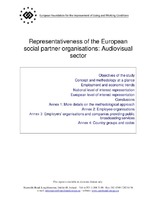| dc.contributor.author | European Foundation for the Improvement of Living and Working Conditions |
| dc.date.accessioned | 2014-08-29T08:00:04Z |
| dc.date.available | 2014-08-29T08:00:04Z |
| dc.date.issued | 2013 |
| dc.identifier.uri | https://ketlib.lib.unipi.gr/xmlui/handle/ket/964 |
| dc.description.abstract | This study provides information aimed at encouraging sectoral social dialogue in the audiovisual sector. The study is divided into three parts: a summary of the sector’s economic and employment background; an analysis of the social partner organisations in all EU Member States, with emphasis on their membership, their role in collective bargaining, social dialogue and public policy, and their national and European affiliations; and finally an analysis of the relevant European organisations, particularly their membership composition and their capacity to negotiate. The aim of the EIRO series of representativeness studies is to identify the relevant national and supranational social partner organisations in the field of industrial relations in selected sectors. The impetus of these studies arises from the goal of the European Commission to recognise the representative social partner organisations to be consulted under the provisions of the Treaty on the Functioning of the European Union (TFEU). |
| dc.format.extent | 100 p. |
| dc.language.iso | en |
| dc.publisher | European Foundation for the Improvement of Living and Working Conditions |
| dc.subject | Work organization |
| dc.subject | Audiovisual sector |
| dc.subject | Performing arts |
| dc.subject | Audiovisual industry. Post and telecommunications |
| dc.title | Representativeness of the European social partner organisations: Audiovisual sector |
| dc.type | Book |
| dc.corporate.name | European Foundation for the Improvement of Living and Working Conditions |
| dc.subject.countries | Europe |

